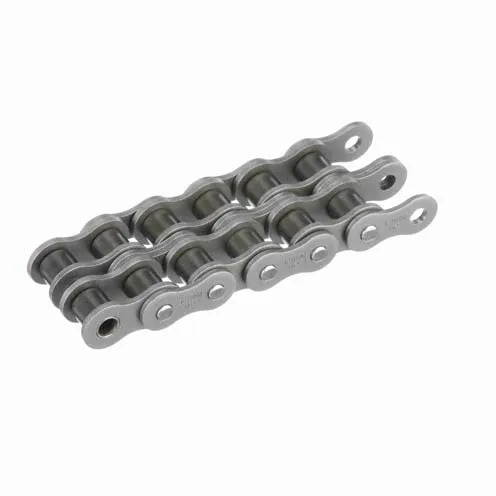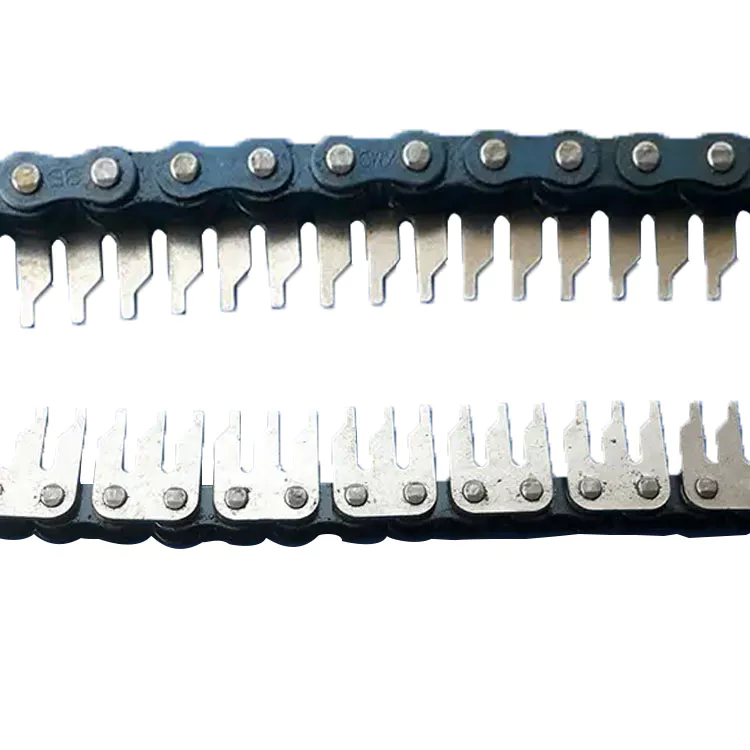Product Description
Product Description
China factory price Single Speed Conveyor Chains for Energy storage industry
Computer-controlled and wheel-based, automatic guided vehicles (AGV) are load carriers that travel along the floor of a facility without an onboard operator or driver. Their movement is directed by a combination of software and sensor-based guidance systems. Because they move on a predictable path with precisely controlled acceleration and deceleration, and include automatic obstacle detection bumpers, AGVs provide safe movement of loads. Typical AGV applications include transportation of raw materials, work-in-process, and finished goods in support of manufacturing production lines, and storage/retrieval or other movements in support of picking in warehousing and distribution applications.
This AGV is equipped with a jacking device, which can be lifted up and transported after diving into the bottom of the rack or material truck. It can carry 1 ton of goods or materials. This style is widely used in the field of warehousing, logistics and handling.This way AGV Robot is widely uesd in warehouse and factory we call it warehouse agv,the back pack agv heavy load capacity is 1000KG,is also a kind of transfer trolley agv ,mobile robot and it’s full name is automatic guide vehicle,unmanned delivery is a new convenient delivery way,it can It can greatly save work time and improve people’s work efficiency. ANWHA is a Chinese manufacturer with many years of technical experience, with the most favorable AGV prices and the best service.The product is best-selling in both domestic and international markets
Product Parameters
| Project | Parameter |
| Name | Omnibearing AGV |
| Overall dimension | L1540*W480*H290(mm) |
| Navigation method | Laser guidance or GPS navigation |
| Diving mode | Omni-directional (dual drive wheels+steering) |
| Running direction | Forward, backward, lateral movement, turning |
| Maximum CHINAMFG speed | 55 m/min (actual speed depend on the path) |
| Maximum lateral speed | 15 m/min (actual speed depend on the path) |
| Maximum Turning Speed | 15 m/min (actual speed depend on the path) |
| Maximum Crawling Speed | 3 m/min (actual speed depend on the path) |
| Cargo Platform Height | 500±10 mm (to be confirmed) |
| Navigation accurancy | +- 10mm |
| Paking accurancy | +- 10mm |
| Rechargeable battery | Lithium iron phosphate battery |
| Charging method | Automatic / Manualcharging |
| Communication method | WI-FI |
| Loading capacity | 2000kg |
| Self-weight (including battery) | ≤1500kg |
| Safety sensing range | ≤ 3m |
| alarm form | Alarm with sound and light |
| Safety protection | Front: Laser non-contact obstacle detection, mechanical pretective barrier Top: Emergency stop buttons (4) |
| Operation environment | Temperature:0-50°C; Relative humidity:10-90% |
| Operating Noise | ≤65 dB(A) |
Certifications
Packaging & Shipping
Company Profile
Anwha (ZheJiang ) Automation Engineering Co., Ltd. is a high-tech enterprise focusing on providing one-stop solutions for Factory Automation. The company was founded in Xihu (West Lake) Dis., ZheJiang in 2011. After 12 years of rapid development, it has had mature intelligent and high-precision assembly technology and testing technology, and integrated efficient logistics warehousing, with quality traceability and information management systems. The company’s solutions have been widely used in automotive powertrain, new energy vehicle powertrain, auto parts, carbon fiber material preparation, aircraft manufacturing and other fields. In June 2019, Anwha joined ZheJiang Electric Group, on the larger platform, where we fully release synergistic effect of the powerful combination. What’s more, we hope to facilitate the transformation of manufacturing industry in China and the world as a whole by the aid of automation and intelligent technology based on our the new platform offering automation technology and service with the combination of production development and system integration service which integrates factory automation software with hardware systems as well.
FAQ
FAQ:
Q1: How about the after sale service?
A : For assured quality all products, we check all products’ quantity twice. The first time is end of production, the second time is before packing into cartons. If any negligence or accident about our goods, after received goods within 10 days, please don’t worry to contact us at any time. We will reply you in 24 hours and let you choose solutions to meet your satisfactory.
Q2:Do you have a CE/ISO certificate?
A : Yes.
Q3: How should we do if we don’t know how to do it?
We will provide detailed instructions and professional installation and debugging. This AGV will integrate seamlessly into the production line.
Q4: When the machine can’t work well, what should I do?
A : 1. The engineer is online for 24-hours, they can check the problems and then give you solution way very soon.
2. All our machines have one-year warranty. If there is any problems of machine parts under ” normal use”, new machine parts will be sent to you but your side should pay the shipping cost.
3. Operation CD and manual will be offered along with machine,ensuring you can operate the machine easily.
/* January 22, 2571 19:08:37 */!function(){function s(e,r){var a,o={};try{e&&e.split(“,”).forEach(function(e,t){e&&(a=e.match(/(.*?):(.*)$/))&&1
| After-sales Service: | Lifelong |
|---|---|
| Warranty: | 12 Months |
| Control Mode: | Continuous Path Control |
| Drive Mode: | Electric |
| Application: | Loading |
| Condition: | New |
| Customization: |
Available
| Customized Request |
|---|
What are the considerations for selecting a low-maintenance conveyor chain?
When selecting a low-maintenance conveyor chain, several considerations should be taken into account:
1. Material Selection:
– Choose a conveyor chain made from materials that are resistant to wear, corrosion, and contamination. Stainless steel, plastic, or self-lubricating chains are commonly used for their durability and low maintenance requirements.
2. Lubrication-Free Design:
– Look for conveyor chains that have a self-lubricating design or are pre-lubricated with materials that reduce friction and eliminate the need for additional lubrication. This helps to minimize maintenance tasks associated with regular lubrication.
3. Sealed Construction:
– Consider conveyor chains with sealed construction to prevent the ingress of dirt, debris, and moisture. Sealed chains require less frequent cleaning and maintenance, making them ideal for low-maintenance applications.
4. Easy Cleaning:
– Opt for conveyor chains that are designed for easy cleaning. Smooth surfaces, open structures, and accessible components allow for quick and efficient cleaning, reducing maintenance time and effort.
5. Resistance to Contamination:
– Select a conveyor chain that is resistant to contamination. This includes resistance to chemicals, oils, greases, and other substances commonly found in the application environment. Chains that can withstand contamination require less frequent cleaning and maintenance.
6. Wear Monitoring:
– Look for conveyor chains that have wear monitoring features, such as wear indicators or sensors. These features help to identify chain wear and provide timely maintenance alerts, allowing for proactive replacement or adjustment.
7. Manufacturer Support:
– Consider the support provided by the chain manufacturer. A reputable manufacturer will offer guidance on maintenance intervals, replacement schedules, and provide technical assistance to ensure the proper functioning of the chain.
By considering these factors, you can select a low-maintenance conveyor chain that minimizes the need for frequent inspections, lubrication, cleaning, and replacement, resulting in reduced maintenance efforts and costs.
Can a conveyor chain be used in food processing applications?
Yes, a conveyor chain can be used in food processing applications. Conveyor chains play a crucial role in the efficient and hygienic handling of food products throughout the production process. Here are some key points to consider:
1. Food-Grade Materials: Conveyor chains used in food processing applications are typically made from food-grade materials such as stainless steel or plastic. These materials are corrosion-resistant, easy to clean, and comply with food safety regulations.
2. Hygiene Considerations: Food processing environments require high standards of hygiene. Conveyor chains designed for food applications incorporate features such as smooth surfaces, open link designs, and easy disassembly for thorough cleaning. They may also have specialized coatings or treatments to prevent bacterial growth.
3. Sanitary Design: Conveyor chains for food processing applications are designed with minimal crevices or joints to prevent food particles from getting trapped. They may have self-draining capabilities to remove excess fluids or debris.
4. Product Integrity: Conveyor chains in food processing applications ensure gentle handling of delicate food products to avoid damage or contamination. They can be equipped with accessories like cleats, side guards, or modular belt systems to securely hold and transport items of various shapes and sizes.
5. High Temperature and Washdown Capabilities: Some food processing applications require conveyor chains to withstand high temperatures during cooking, baking, or sterilization processes. Specialized chains with heat-resistant materials or coatings are available. Additionally, conveyor chains used in food processing should be capable of withstanding frequent washdowns and cleaning with water or cleaning agents.
6. Compliance with Standards: Conveyor chains used in food processing applications must comply with industry-specific standards such as FDA (Food and Drug Administration) regulations, HACCP (Hazard Analysis Critical Control Point) guidelines, and other food safety certifications.
When selecting a conveyor chain for food processing applications, it is important to consider the specific requirements of the production line, including the type of food being handled, the operating conditions, and the necessary sanitary standards. Proper maintenance and regular cleaning protocols should also be implemented to ensure food safety and product integrity.
How do you troubleshoot common issues with conveyor chains?
Troubleshooting common issues with conveyor chains involves identifying the problem and taking appropriate steps to resolve it. Here are some common issues and troubleshooting approaches:
- Chain Slippage: If the chain is slipping or not engaging properly with the sprockets, check for proper tensioning, alignment, and lubrication. Adjust the tension if necessary and ensure the chain is properly aligned with the sprockets.
- Chain Jamming: If the chain is frequently jamming or getting stuck, inspect the conveyor for any obstructions or foreign objects that may be causing the issue. Clear any debris or blockages and ensure the chain’s path is clear.
- Excessive Noise: If the chain is making loud or unusual noises, check for proper lubrication. Insufficient lubrication can cause increased friction and noise. Apply the appropriate lubricant according to the manufacturer’s recommendations.
- Chain Breakage: If the chain is breaking frequently, inspect for any damaged or worn-out components. Replace any broken or worn links, pins, or attachments. Also, check for proper tensioning and alignment, as excessive tension or misalignment can lead to chain breakage.
- Chain Wear: If the chain shows signs of wear, such as elongation or corrosion, consider replacing it. Excessive wear can affect the performance and lifespan of the chain. Regularly inspect and measure the chain for wear and replace it when necessary.
It’s important to follow proper maintenance practices, including regular inspection, lubrication, and tensioning, to prevent and address common issues with conveyor chains. Consult the manufacturer’s guidelines and seek professional assistance if needed.
editor by CX 2024-04-22



